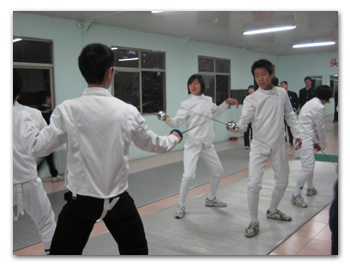by Jane Sandbank | Sep 7, 2015 | Uncategorized
SEPTEMBER 5, 2015
(Read to Graduate Education Students at Hunter College)
I often kidded Dr. Sobol when I was his student and he my professor, mentor, inspiration and dissertation advisor, that we were connected because when he talked to his students about civil rights and the March on Washington, I was the only one old enough to have been there with him. I went back to get my doctorate in education when I was 50. Although I had several Masters Degrees and administrative credentials, I had always aspired to getting a doctorate and going to Teachers College.
I took every course he taught and had the great privilege and good fortune to have many conversations with him before or after class and after I had received my doctorate degree. He was tough on me at the defense and I was surprised by just how tough. There was no compromise of his standards when it came to the hard work of academic study, teaching and learning, ethics, social justice, creating a worthy inclusive curriculum, and the possibilities of positive social change through schooling. The work was just too damned important; the stakes too high.
He profoundly influenced the current generation of educational leaders and all of those whom he taught not only through his brilliance and passion about children and schooling, but also through his creativity and infectious joy in the process of learning. He started a national advocacy group called Public Schools for Tomorrow, an organization to deal with what he called the “quiet crisis” in current educational policy that does not address the issues of how to educate impoverished children.
One of the most exciting and humbling experiences in my 35 year career in education is when Tom asked me to teach his policy class at Teachers College. His health had been declining for some time and it became clear to him that he did not have the physical capacity to teach that semester. He made all of his materials and course plans available to me and said, “If this is any help to you by all means use it. But Jane, this is your class – make it yours.”
And because of what he had taught me, I could do that. We will miss his wise counsel and warm smile, and we will pass on to the next generation of educational leaders the lessons he taught.
by Jane Sandbank | Apr 21, 2015 | Policy and Practice, Standardized Testing, Uncategorized
Editorial: New York leaders misread opt-out message
The Journal News
Let reason prevail. The April 17, 2015 Journal News editorial, “New York leaders misread opt-out message,” presents a good regional and national perspective on Common Core, testing and teacher evaluation. NYSED, Board of Regents, Arne Duncan, President Obama, school boards, presidential candidates, legislators and Governors should:
- Value and trust parents, teachers and administrators.
- Look at the opt-out data (from 20 – 40% in many of the Lower Hudson Region of New York according to the Journal News article); it is significant and a game changer. If state and Washington education departments, governors and legislators are making decisions based on data, than they should realize the significance of the high numbers of parents who object to the weight given to standardized testing and its negative impact on their children and teachers. We are told that we must make critical decisions about deploying precious fiscal and human resources based on data. The story the data tells is clear.
- Change course now.
It will not benefit any let alone all students to pursue a failed reform movement. Current research points to the importance of recruiting, retaining and training, highly qualified teachers and administrators as well as aligning certification programs and professional development to the real world skills educators need to ensure that their students will be college and career ready. This pedagogy for the 21st century involves educating the whole child; it involves understanding the challenges of technology and the emotional complexity of growing up in today’s uncertain and rapidly changing world. This does not mean spending precious days, weeks and dollars on test prep. Moreover, controversy abounds not only about the validity and reliability of the tests, but also about the curriculum on which these tests are based. Is it a curriculum for today and tomorrow or for yesterday?
- Collect data on what educators think is best in Common Core and what else constitutes curriculum.
- Improve teacher and administrative certification programs to better align with 21st century research on how kids learn.
- Co-create with all players a teacher evaluation system that creates a true 360 model.
And stop wasting time and creating a highly stressed generation of children aged 9 – 14 who hate school.
by Jane Sandbank | Mar 26, 2015 | Commentary
New York Times
Eduardo Porter, ECONOMIC SCENE, March 24, 2015
Grading Teachers by the Test
The Business Section of The New York Times, specifically in space given to stories about the economy, is reporting on what various states are doing and what several studies conclude about the value of using student test data to evaluate teacher performance. As parents increasingly “opt-out” their children from taking these tests and as concerns increase from parents and educators about how test makers are monitoring students’ social media sites, the advantages and problems of tying these scores to teacher evaluation is a hotly debated topic in the larger political and economic arena. Schooling is a multi-billion dollar industry and everyone wants a piece of the action. Applying a corporate bottom line to teaching and learning is a bad idea. As Iditarod winner Susan Butcher proclaimed, teaching her dogs to be winners, to persevere, to work as a team, to learn and be winners started at birth and depended on how they were treated and trained and cared for each and every day over years. One has to take a very long view to produce a champion she proclaimed. Ask any pro athlete and she’ll tell you the same thing.
“Some things they do will be good, in line with the objectives. Others will amount to cheating or gaming the system.” – Jonah Rockoff, Columbia University
“A performance metric is only useful as a performance metric as long as it isn’t used as a performance metric.” – Luis Garicarno, London School of Economics
Issues abound: how kids and teachers are “sorted;” who takes the test, gets extra resources and who doesn’t and who decides; drill and kill or teaching to the test; the value-added of the tests; how valid and how reliable are these tests anyway; factors outside of the teacher such as children living in poverty, resources of the school district and more. Many teachers do not want to teach either Special Education students or top students for the same reason: hard to get scores up at both ends of the student spectrum.
Ultimately this testing madness is not serving the important purposes which would make tests worthwhile: giving teachers information about students that will further the teacher’s ability to pinpoint the areas where a student needs extra support; where a curriculum needs improving; or where the teacher needs to improve in either content knowledge, pedagogy or both.
Professor Rockoff goes on to say, “. . . do not put too much weight on any single measure.”
I don’t think we need in depth university research and studies to come to the conclusion that any one moment in time, any one test, any one event can tell us all we need to know about the many factors that make up excellent pedagogy that results in student learning. Let reason prevail and redirect the high high costs of test making, test administration, and scoring analysis, into improving teacher training, teacher quality and increasing resources directly to the primacy of what goes on in a classroom each and every day.
A parent was outraged by his school telling parents that test results would not be back for one year. “What a waste is that?” Indeed.
by Jane Sandbank | Jan 27, 2015 | Creative Learning
 The many delegations of Chinese educators we’ve hosted in Brewster, New York over the past seven years, inevitably ask us one question: “How do we teach our kids to be creative?”
The many delegations of Chinese educators we’ve hosted in Brewster, New York over the past seven years, inevitably ask us one question: “How do we teach our kids to be creative?”
Over the last seven years as the Brewster School District superintendent, I’ve had the great good fortune to develop high school partnerships between Brewster High School and high schools in Beijing, Shanghai and Xian. We’ve sent over a hundred students to our sister schools there. Our students lived with host families and in addition to attending classes had a chance to cook with the grandmas, watch the Olympic torch carried through the streets with their Chinese classmates and friends, and post-college, find work with international companies headquartered in Beijing. Our students went on to gain mastery of the Mandarin that they started to learn in middle school. More important, they became global citizens with not only a new appreciation for a very foreign land, but also a new appreciation for what they have as Americans.
While we are moving in the direction of more testing and a more monolithic curriculum and national standards, Chinese educators are moving in the opposite direction.
During this time, we have hosted many Chinese students who similarly lived with American families and attended classes with their new Putnam County friends. They accompanied the families to theater on Broadway, visited colleges, and spent some weekends in summer homes in Maine and on Long Island. They learned that American kids study and work hard as well as play hard. Stereotypes, East and West no longer held.
 I was struck by the discipline of our Chinese students and the serious discussions that we had with them, their principals and teachers about the goals of an education; about their hopes and dreams. Not much different from ours. I was in awe of how well these students did in our Advanced Placement classes given they were attending classes in English and in US History not just Physics and Calculus. Our own students were somewhat embarrassed by how they were unable to speak to their new friends in Mandarin (and how proficient their counterparts’ English was) and as a result worked much harder learning a new language.
I was struck by the discipline of our Chinese students and the serious discussions that we had with them, their principals and teachers about the goals of an education; about their hopes and dreams. Not much different from ours. I was in awe of how well these students did in our Advanced Placement classes given they were attending classes in English and in US History not just Physics and Calculus. Our own students were somewhat embarrassed by how they were unable to speak to their new friends in Mandarin (and how proficient their counterparts’ English was) and as a result worked much harder learning a new language.
I began this exchange after I had read Thomas Friedman’s book, “The World is Flat.” I believe the best way for our students to become global citizens is to get out of Dodge and practice being a global citizen while still in school. 100% of students who have been involved with the program, report that it has been the most meaningful and transformative part of their school experience. Our Board of Education, administration and community have been wonderful in support of these exchanges. For some of our students, their first experience on an airplane was to Beijing.
I too have been transformed by my visits to China and the friendships I’ve made with students, teachers, and administrators from our sister schools. Their warmth and hospitality are impressive. So I struggle with the answer to the question about creativity. I don’t want to give a simple, short glib response. While we have already moved to administer more standardized tests and a monolithic curriculum and national standards, Chinese educators are moving in the opposite direction.
It is hard to undo centuries of an education system built around the performance on one test to determine the future of a child and of a nation. The dismantling of that idea is exactly what is beginning to happen throughout schooling in China. Just as educators in that country realize that one needs to pay attention to the unique talents and gifts of each child, we need to return to that belief here in America. That belief is how we “teach” creativity. It is who we are and accounts for our greatness as a nation. That greatness is not measured by performance on a pencil and paper test and never has been. We need no more reform movements. We need to remember that what our schools have historically done is how we became the nation that is the envy of the free world. And we need to return to what we do best in schools: value each and every child and teach them well.
by Jane Sandbank | Jan 7, 2015 | Educational Leadership, Policy and Practice
 If you’re like us you read some of the lists of the best of 2014; the best dressed, the best athletes, the best TV shows, the best photos and even the best news stories. ED WEEK compiled their Top Education Commentaries of 2014: Education Week’s Most-Viewed. They capture the topics and controversies that not only define the important ideas of the past year, but also suggest how we might move ahead in 2015 and create schools that will better serve our students. You’ll recognize the buzz words from our field: grit, bullying, the marshmallow test, social emotional intelligence, diversity, equity, reform and of course standards and common core. Here are quotes from three of these articles. You will recognize the names. Collectively, they make compelling cases for what we must do:
If you’re like us you read some of the lists of the best of 2014; the best dressed, the best athletes, the best TV shows, the best photos and even the best news stories. ED WEEK compiled their Top Education Commentaries of 2014: Education Week’s Most-Viewed. They capture the topics and controversies that not only define the important ideas of the past year, but also suggest how we might move ahead in 2015 and create schools that will better serve our students. You’ll recognize the buzz words from our field: grit, bullying, the marshmallow test, social emotional intelligence, diversity, equity, reform and of course standards and common core. Here are quotes from three of these articles. You will recognize the names. Collectively, they make compelling cases for what we must do:
“Neglecting the emotional education of children and adults risks leaving children at the mercy of every emotion they feel and every aggressor who comes along.” – Marc Brackett
“Focus less on ‘fixing kids’ and more on improving what and how they’re taught.” – Alfie Kohn
“The transition to simple, priority-driven school improvement might require a kind of civil disobedience: a refusal, by a critical mass of educators, to implement anything unless it has been adequately piloted, amply proven, and then made clear and simple enough for educators to learn and implement successfully.” – Mike Schmoker
The NY Times editorial The Central Crisis in New York Education addresses the schism among Governor Cuomo, the Regents and the NYS Teachers concerning the $2 billion it will take to ensure educational equity for New York’s students.
You can also read the Campaign for Educational Equity blog: New York Times Challenges Governor Cuomo to Face Educational Reality in State of State.
For additional postings, check out our Ed Trends page. We update it regularly and are sure it will stimulate conversation among your colleagues.
We thank you all for the work you do each and every day on behalf of this nation’s children and wish you all the best in 2015.
Warmly,
Jane Sandbank Group
by Jane Sandbank | Dec 10, 2014 | Special Education
 Parents, Legislators and Administrators Advocate for Children in Special Act Public Schools
Parents, Legislators and Administrators Advocate for Children in Special Act Public Schools
Folks like to say that Mt. Pleasant Blythedale, is “the school where students learn as their bodies heal.” The school was created in 1971 to provide equal access to children with serious medical needs who require intensive rehabilitation. The students are transitional sometimes there only weeks or sometimes several years, but eventually students are discharged from the rehabilitation hospital connected to the school and returned to their community schools.
Like all schools hit hard by the 2008 fiscal crisis, Special Act Schools, were hit particularly hard. Like its students, the parents are also transitional so providing stable parent advocacy is even more problematic than in typical schools.
Grass roots parent advocacy led to the now famous court decisions and legislation, PL 94-142, that revolutionized the way Students with Disabilities are educated. Of the ten special act public school districts in New York State, only MPB had an organized group of parents who understood and embraced the need for serious fund raising for programs and personnel, not just celebrations and special events.
“Neither the school nor the parents will ever be the same.”
By chartering an official SEPTA PTA and enlisting the support of Assemblywoman Shelley Mayer, chair of the Assembly subcommittee on students with special needs, the MPB SEPTA, planned a kick-off event held November 24th where 90 parents, teachers, students, legislators David Buchwald, Thomas J. Abinanti, and members of the NYS Board of Regents attended.
Assemblywoman Mayer followed with a call to action and is spearheading along with the parents, legislators and Regents the advocacy efforts to reframe budgeting for Special Act schools. So as many times as Margaret Mead has been quoted about never doubting “that a small group of thoughtful committed citizens can change the world,” these words are truer and more important today than ever.
Superintendent, Dr. Ellen Bergman has stated that no matter what the outcome of this budget season, “MPB SEPTA has given voice to the disenfranchised. Neither the school nor the parents will ever be the same.”
by Jane Sandbank | Nov 1, 2014 | Policy and Practice
 We can remember the reading wars and sadly they are still going on. Now we have the data wars too: What data is important? How do we help teachers access and use data to guide instruction? What data is dangerous and hurting student outcomes?
We can remember the reading wars and sadly they are still going on. Now we have the data wars too: What data is important? How do we help teachers access and use data to guide instruction? What data is dangerous and hurting student outcomes?
Carol Black’s blog, “A Thousand Rivers,” describes diverse global learning environments to critique our attention to data and programs such as phonics in our schools. I don’t agree with everything she writes in this extensive article, however, one quote about data stands out:
“Collecting data on human learning based on children’s behavior in school is like collecting data on killer whales based on their behavior in Sea World.”
In workshops with administrators and teachers on matters as diverse as how to use student test data; choose, implement and evaluate a reading program; or implement system-wide inclusion, I ask folks to write about and then talk about how they learned to read. Everyone remembers. Learning to read is a big deal! My father taught me how to read by reading the Sunday Daily News comics to me every week. He’d make a special breakfast, lox and eggs and onions with a bialy and read ‘Nancy” and “Brenda Starr Reporter” to me. These were my faves. My dad was orphaned and abandoned at birth. He had no formal schooling. In fact, he had no language until he was 10 and emigrated to the U.S. Even after that his English was spotty. We lived in a one bedroom tenement in the South Bronx (aka Fort Apache); he, my mom and my sister who was 8 years older than I. She was a terrific and prolific reader and insisted that I trade the Bobbsy Twins for Thomas Mann. The storefront library on Southern Blvd. saved the two of us. Anyway, my dad would read the comics to me, pointing to every word and now and then ask me to read the word. Soon I was reading the comics to him and the Golden Books to my mom. When I entered kindergarten at 5 by today’s standards I would be a proficient 4th grade reader. My teachers always gave me more “advanced” books; I loved Mark Twain, Edgar Allen Poe and all poetry. They helped me with the hard words or explained stuff to me that I was unsure of. They somehow knew how to do this without formal testing, data reviews or rubrics. They knew what I loved to read and what I found boring. There were at least 45 kids in the class in my elementary school. Maybe some were even repeating the grade. They all could read, albeit at different levels and that was okay. We cheered when they read Dick and Jane out loud or recited “Paul Revere’s Ride.”
Somehow children learned to read well, add or even how to solve complex problems before we formalized data collection and analysis. Could we do more now to advance student learning? Sure. Does the Reform Movement, Common Core, Standardized tests and Pearson help? How many dots on the head of a pin? There are more caring and expert teachers in every school across America than there has ever been. These same teachers however have to spend precious hours on data teams, data analysis, data reporting, testing, grading, retesting and their own evaluations are based on this same questionable data. Third graders instead of reading about favorite topics or heroes have to sit still and struggle through boring reading passages and then answer unclear questions that their teachers are unsure of. This leads to frustration, reading as a stressful and often punitive activity, especially for weaker students. Perhaps this is why boys score lower than girls. Maybe it’s more about sitting still than reading level. Perhaps teachers have not been given ample time and professional development to relearn and learn to teach math conceptually yet “It’s on the test!” Applying mathematical concepts to solve complex real world problems is much different from learning the mechanics of subtraction.
Data is important, but not just test data. Does the teacher know each and every day how every child is feeling? Data collection strategy: “Jane, how are you feeling?” Critical data with no cost. What interests the student, engages the student, excites the student? Are they hungry or did they have a fight before coming to school? It is pretty well documented by now that the reliability and validity of the tests are questionable at best. We’ve left the essence of the child and of the teacher behind. Perhaps if we rethink how we learned, we can help our teachers and students more.
Carol Black asks about how we somehow all learned to use computers; especially those of us who went to school before there was a smart board in every classroom. How did you learn to use a computer? I bet we all learned in different ways, but somewhere along the line we became proficient.
School leadership can build whole school capacity and ensure teachers have a broad range of skills and materials to not only teach reading, but also all subject matter more successfully. Acknowledge and celebrate the many small moments of success. Learning and indeed school can and should be joyful. There is essentially no need for reading wars or data wars or math wars to continue. Phonics may be helpful to some students and not others. With appropriate professional development teachers can gain the requisite skills to know what data they need and how to find and use it. They need to ask the right questions, including how they and their students are feeling.
by Jane Sandbank | Oct 14, 2014 | Emotions and Learning
 “Nothing important gets done alone,” according to Daniel Goleman. Following the hazing story in Sayreville, New Jersey I am thinking it is a great teachable moment for kids, parents, teachers, coaches and school leaders. No doubt, we have all dealt with some version of this story: hazing, bullying, or sexual harassment. Hopefully we have not experienced anything as serious.
“Nothing important gets done alone,” according to Daniel Goleman. Following the hazing story in Sayreville, New Jersey I am thinking it is a great teachable moment for kids, parents, teachers, coaches and school leaders. No doubt, we have all dealt with some version of this story: hazing, bullying, or sexual harassment. Hopefully we have not experienced anything as serious.
Schools have established programs, policies and procedures to deal with such issues. I fear we often make the mistake of looking at interventions as separate from our imbedded required curriculum. We might have an assembly, bring in a speaker, or offer packaged programs under the special education, athletics, or special services umbrella. We seldom step back and evaluate how successful these programs are or revisit them based on rapidly changing environments and situations. We tend to respond to specific incidents and not work as hard to prevent them. Drug and alcohol prevention programs and school safety training for example, work much better than rehab or looking at our security after an incident. We have the data to prove the point.
So too, a systemic approach that includes building social emotional skills such as responsibility, self-awareness, social awareness, problem-solving, relationship and team building, learning ways students themselves can deal with stress, anger, depression are as important as improving skills in reading and math. More correctly, attention to behavior and academic performance goes hand in hand. We can teach both.
In working with the Yale Center for Emotional Intelligence I have seen how this work can transform an entire district’s culture. At JSG, we are using this research to custom design programs to solve problems. One size does not fit all. Here are some of the methods that work:
- Learning and using the principles and language of Emotional Intelligence
- Through small group discussion, stories, case vignettes, writing and sharing, learning habits of reflection, mindfulness, stress management, dialogue, conflict management, empathy and more
- Checking in and coaching
- Monitoring program effectiveness
Please do not hesitate to contact Jane Sandbank Group to learn more.
Jane Sandbank, Ed.D.
914-222-0388
www.janesandbankgroup.com







Recent Comments